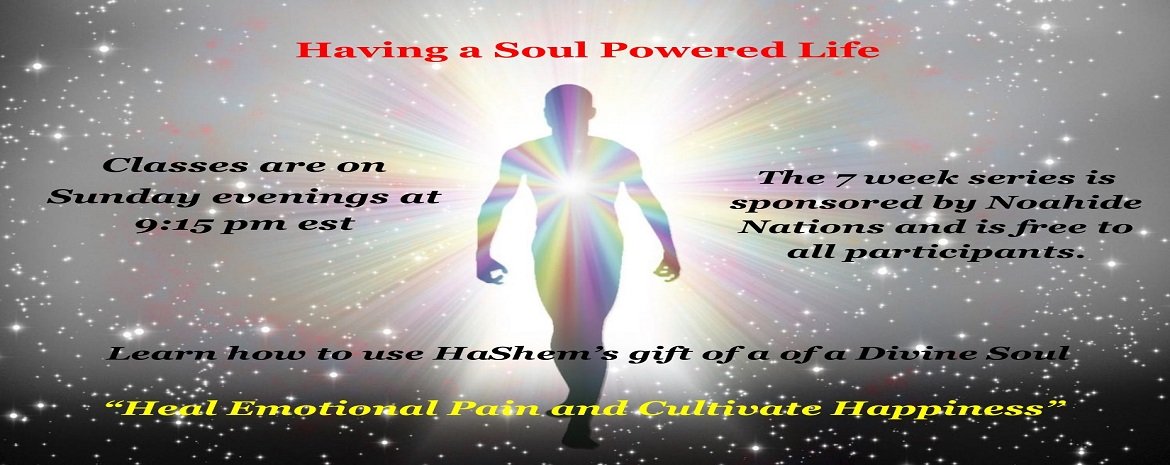
Noahide Torah Courses
Noahide Nations has conducted nearly 3000 live online Torah classes over the past 15 years. Many of these classes are available in audio recordings. Here are just some of these courses.
God's Instructions
When God created man on the 6th day He wanted mankind to live in peace and harmony, through His Mercy. He gave Adam 6 instructions in order to live this way. After the flood He gave Noah a 7th. These are the Noahide Commandments.

Read More +
Noahide Prayer
For Noahides, prayer is considered a mitzvah when performed in response to personal needs or circumstances.

Read More +
Develop a Torah Personality
Help for perfecting your relationship with HaShem and yourself.

Read More +
Listen To Noahide Laws & Life Cycle Class
Listen to the overview from a previous class from the Noahide Torah Study Yeshiva Course.

Read More +
Seek Torah Wisdom
Torah wisdom should always flow through you. Learn about Hashem and you will learn about yourself!

Read More +
After The Flood
Ever wonder what happened when Noah and his family exited the Ark after the Flood?
Wisdom From Pirke Avot
Simon the Just…used to say,
“Upon three things the world stands:
On Torah, on (Divine) Service, and on Deeds of Lovingkindness.”
Pirke Avot 1:2
Ben Zoma said,
“Who is wise? The one who learns from all people…
“Who is mighty? The one who subdues the evil inclination…
“Who is rich? The one who rejoices in his portion….
“Who is honored? The one who honors other human beings….”
Pirke Avot 4:1
The Most Important Part of Studying Torah
The most important element in validating interpretations of the written and oral Torah is the concept of Mesorah. Mesorah is the greatest proof to the authenticity of any concept, practice, or interpretation.
Although the seven Noahide laws have their origins in Adam and Noah, God chose to transmit and preserve them via Moses and the giving of the Torah at Sinai. This placed the Seven Mitzvos within the structure and system of Torah study and learning. Therefore, the seven Noahide laws must be interpreted and understood within the context of the Torah.
This point cannot be stressed enough: Jewish, and therefore Noahide, study and interpretation of the Torah is unique and unlike the study of any other religious texts.
The Truth About the Ger
Don't ever be afraid of seeking truth or speaking the truth, as it says in
Proverbs 12:19...
Truthful lips will be established forever, But a lying tongue is only for a moment
Are Noahides Allowed to Pray?
For Noahides, prayer is considered a mitzvah when performed in response to personal needs or circumstances. If one experiences challenges for which he does not pray, his lack of response is tantamount to a denial of God as the sovereign ruler of all things and all events. When one does pray in such circumstances, it demonstrates reliance and belief in the Creator.
When a Noahide prays to give thanks or praise absent a personal need, he still receives reward for such prayer even though it is not of the same nature as prayer prompted by personal needs.
As with all personal prayers, there are no fixed texts for Noahide prayer. Since all Noahide prayer is essentially personal prayer, it is ideally expressed using sincere words from the heart.
Tools For Noahide Torah Study
The journey of Noahide Torah study is endless in depth and has no destination. You will realize this when your very essence proclaims, "the more I learn, the less I know"! Before you make this proclamation remember that it is a mitzvot for a Noahide to study the Noahide Laws and apply them in every aspect of their life. After you make that proclamation you will realize and appreciate why it is a mitzvot for a Noahide to study the Noahide Laws and apply them. The study of Torah is what gives us our awe of the Creator. The more we study the more awe we gain.
The Noahide Laws: Their Meaning and Logic
- Category: Noahide Laws
- Hits: 6583

The following article originally appeared in the Connections Newsletter; April, 2013
The Noachide Laws: their meaning and logic
The 7 Noahide laws were given to mankind many years before the Jewish people received their commandments. These laws are universal, and are intended to allow all mankind to connect to their Creator. They are as follows:
1.Do not eat a limb cut off a live animal
2.Do not curse God’s name
3.Do not worship idols
4.Do not commit adultery
5.Establish courts of law
6.Do not steal
7.Do not murder
At first glance, these seven laws appear very random, but I will attempt to clarify their logic based on the commentary of the Jewish Mystic, The Maharal of Prague (1520-1609); it is my hope that a clearer understanding of their structure will lead to more respect for these laws and more meaning in their observance.
The first distinction to be made is between laws pertaining to interpersonal relationships, and those relating to G-d. It is not enough to have a relationship with G-d and forget about His children- a truly refined person will have respect for all of creation. Conversely, it is not enough to not cause harm to others without having a relationship with G-d- “being a nice person” has no value in a G-dless universe[1].
Laws 2-4, not cursing G-d’s name, believing in powers other than G-d (such as idol worship), and even adultery[2]are all things that do not cause harm to other individuals. Meanwhile, setting up courts, not stealing or murdering establishes the minimum framework for a functioning society.
What about the first and strangest one, not eating the limb off a live animal? The Maharal explains that this comes to teach us self-control. You must control your appetite and wait for the animal to die before eating it. This issue is more prevalent than one might think: meat processing plants may begin to chop up the freshly killed animal before it finishes twitching, the point at which Jewish law defines the animal as fully dead for this purpose.[3]
This law that teaches self-control stands on its own as a sort of “master law”, since this is the trait required to fulfill all the other laws- without learning self-control there is no way you could resist the various temptations that present themselves. For the same reason, the last of the Ten Commandments is “do not covet”, to teach us that a person without the self-mastery to resist coveting what isn’t his can end up transgressing all other sins.
But we can still break things down further. Why three commandments per category? The Maharal explains that these three commandments serve to perfect and restrain the three elements of a person: their physical body, their soul, and the complete human being that results from the combination of body and soul.
In the man-to-G-d realm, adultery applies to a person’s body, as it is an expression of the desires of one’s physical body; meanwhile, believing in alternative powers applies to the soul, since it can be transgressed through thought alone as opposed to most other sins that require action.
Cursing G-d’s name applies to both, because it strikes at the very root of human existence- man was created to worship God and here he does the exact opposite, denying His very existence. Furthermore, it involves speech, which is the meeting point of thought (thinking of what to say) and action (actually moving the mouth); Judaism teaches that speech is the loftiest of human expressions and that which sets humans apart from all other creatures.
Correspondingly, in the man-to-man dimension: stealing corresponds to a person’s body, since it is a result of a physical urge for something that is not yours.
Setting up courts corresponds to the soul, since, the Maharal explains, it is our soul that yearns for justice and truth and serves as a moral compass for our behaviors; disregarding justice then, is a blow to our soul.
Finally, murder is the ultimate expression of disregard for both body and soul, since it involves the removal of a complete human being from the world. Man was created in G-d’s image and put in this world to serve G-d; therefore, striking down a man corresponds to cursing G-d’s name and denying His existence.
As an interesting final note, there is a Jewish tradition that seven key individuals or societies from early history transgressed against each of these seven laws respectively (e.g. the courts in the city of Sodom were routinely guilty of gross injustice, violating law #5). Correspondingly, from Abraham on came seven individuals who corrected this behavior through fastidious observance of each of these laws (e.g. Joseph showed tremendous self-control when tempted by the wife of Potiphar, thus upholding law #4).
[1] Removing God from the equasion sets the stafe for moral relativity, where absolute truth does not exist and where your opiion –or the opinion of society as a whole- is no more valid than mine. At which point anyone can do whatever they want and still call themselves “a nice person” by their own standards.
[2] Adultery causes no tangible damage to anyone else, especially if the one being cheated on doesn’t even know about it.
[3] Eating meat was only permitted from Noah onwards, hence the name Noahid laws; the prohibition against eating limbs fromlive animals didn’t apply until then. Instead, Adam, the first man, was prohibited from eating from the ‘tree of knowledge of good and evil’ for the same purpose, to teach him self control.


 French (FR)
French (FR)  English (UK)
English (UK) 

























 Choosing a Rabbi
Choosing a Rabbi What Is Tzedakah?
What Is Tzedakah? The Science in Torah
The Science in Torah Why Study Torah?
Why Study Torah? Afterlife, Moshiach & Redemption
Afterlife, Moshiach & Redemption Your Soul
Your Soul